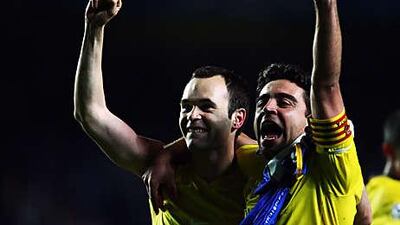Asked how much it helps to play for Spain alongside Xavi, his Barcelona teammate, Andres Iniesta's face lit up. "It's a really big deal," Iniesta said. "We know and like each other, we've played together for years at Barcelona - and now Spain - and sometimes you don't need to think or look to know where he will be or what he's going to do.
"But we have also benefited with Cesc [Fabregas], [David] Silva, [Juan] Mata, [David] Villa, Xabi [Alonso] and so on. The style of all the players fits together so well. We share a mentality and that's where the biggest benefit comes." Footballers always feel obligated not to miss any of their peers out of fear of causing offence. They often list the long-term injured and players long relegated to the reserves.
Mata, Silva, Cesc, Xabi and especially Villa all play their part for Spain, but Xavi and Iniesta remain the focus for football lovers, the perfect foil for the other. "You have to talk about these guys together," said Ronald de Boer, the former Barcelona and Holland midfielder. "They play football the way it should be played. People think footballers should be big, strong and fast and that there's no technique, but then you see these guys and they are still able to play the most beautiful game.
"They play one-touch football, they can dribble, they know where their opponent is. For me, this is how football should be played." Xavi and Iniesta are widely considered to be among the best players in the world; their telepathy understandable given their schooling in Barca's cantera and the number of games they have played together in Barca's first team. Xavi was 11 when he joined Barca; Iniesta 12. Both moved quickly through the youth ranks for club and country.
Xavi, at 30, is four years older than Iniesta. He made his first-team debut aged just 18 in 1998 and is sure to become the Catalans' all-time appearance record-holder. An injury to Pep Guardiola in 1999 meant Xavi became Barca's playmaker, a position he has retained ever since. He lists Guardiola as his idol, the man he tried to emulate. In turn, Guardiola's greatest inspiration is Johan Cruyff, the Dutchman who laid the template for the modern Barca, a style of play which has been adopted by Spain with great effect.
Xavi made his Spain debut in 2000, and Sunday's World Cup final against Netherlands will see him awarded his 94th cap. Iniesta began as a defensive midfielder and played three seasons for Barca B in Spain's regional third division before making his debut in 2002, also aged 18. He made his Spain debut in 2006 and will make his 49th La Roja appearance in Soccer City. The pair have been Barca mainstays since 2004/05, when coach Frank Rijkaard paired them. A year later, Barca won their second European Cup. In 2009, they added a third. They also have five league titles and a multitude of individual honours - Xavi was named Player of the Tournament in Spain's victorious 2008 European Championship campaign.
"What Xavi and Iniesta, in particular, bring to the national side is a way of playing very similar to Barcelona's style with lots of movement, lots of passing and lots of speed," said one teammate, Valencia's Mata. "Winning Euro 2008 gave us a lot of self-confidence and we are keen to carry on from where we left off." Such confidence has taken Spain to the World Cup final, the only major trophy Xavi and Iniesta have yet to win in their magical careers. It is tantalisingly within their grasp.
sports@thenational.ae


